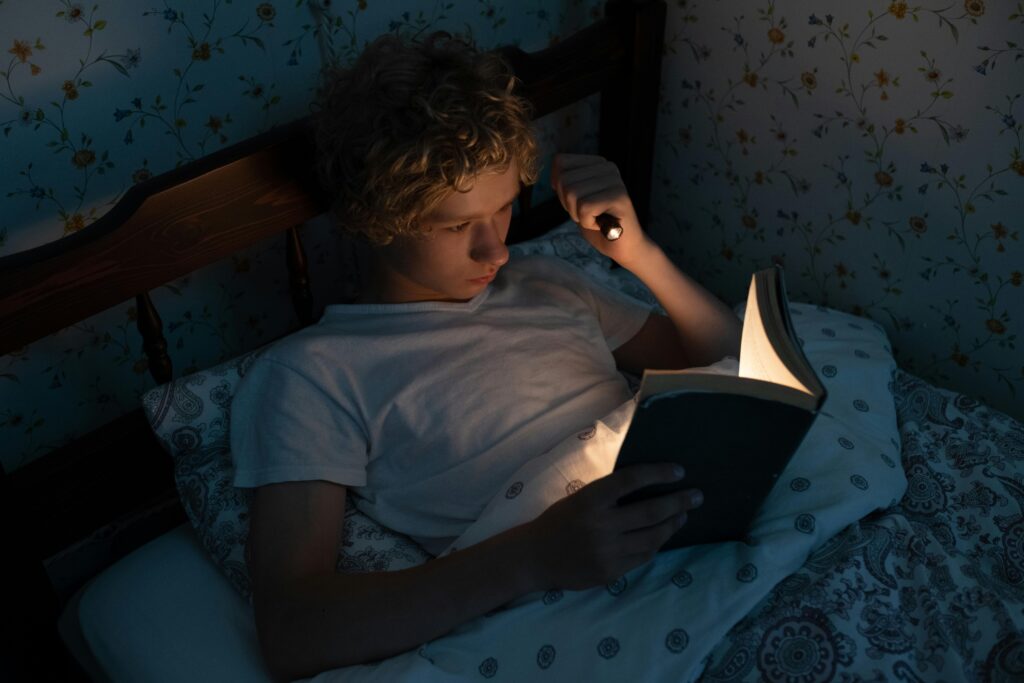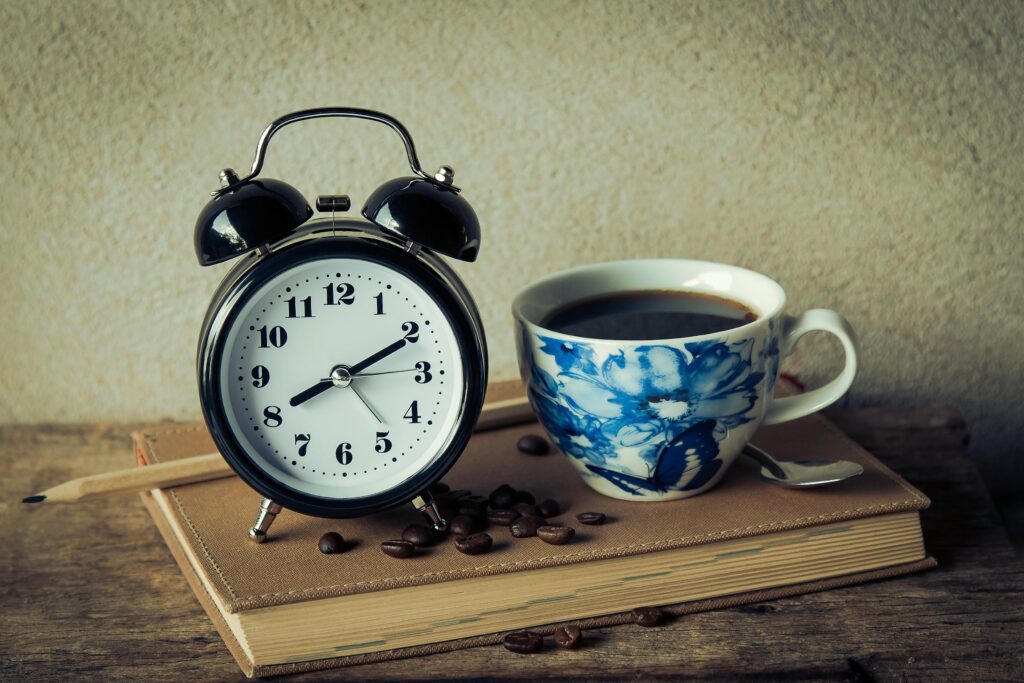Good sleep isn’t just about how long you’re in bed—it’s also about how well your body prepares for rest and how it wakes up. Whether you’re a busy professional, an athlete, or recovering from injury, refining your sleep habits using our sleep hygiene tips can make a huge difference to your energy, focus, and recovery.

Before Bed: Setting Up for Quality sleep
- Set a consistent sleep time. A regular sleep schedule helps reinforce circadian rhythms, improving both sleep latency (time to fall asleep) and sleep efficiency. Even trying to maintain this over the weekends – aim to have less than 30 minutes difference between sleep/wake times each day.
- Limit screen time in the last hour. Blue light suppresses melatonin and delays sleep onset. One study showed that using eReaders before bed significantly delayed REM sleep and reduced alertness the next morning.
- Create a wind-down routine. Relaxation techniques like reading, meditation, or stretching activate the parasympathetic nervous system and reduce sleep onset latency.
- Avoid caffeine, alcohol and stimulants late in the day. Caffeine blocks adenosine receptors and delays melatonin release. Alcohol may help with sleep onset but leads to more fragmented and poor-quality sleep.
- Optimise your sleep environment. Cooler temperatures (~18°C), darkness, and quiet improve sleep depth and reduce nighttime awakenings.
Morning Routine: Start the Day Right
- Get early light exposure. Morning light is the strongest cue for synchronising circadian rhythms. It improves alertness, mood, and sleep later that night.
- Wake up at the same time everyday. Consistency in wake-up time is even more important than bedtime for aligning circadian rhythm and stabilising sleep quality. Our bodies and brain like routine!
- Get moving early. Light activity like a walk or mobility work boosts cortisol naturally and helps transition out of sleep.
- Do not hit the snooze button. Fragmented morning sleep increases grogginess (sleep inertia) and reduces mental performance. This is often caused by when we hit snooze and go back to sleep, we then start another sleep cycle and we break this again once we wake back up a few minutes later.
- Eat a balanced breakfast. Eating early helps anchor your body clock and can enhance cognitive performance and energy levels throughout the morning. A breakfast high in protein within 1-2 hours of waking will also help suppress hunger levels throughout the day and can stop snacking.
- First 30 minutes after you wake up will shape your nervous system for the day. Your brain transitions from delta and theta waves (deep and light sleep) to then alpha and then beta waves – the ones linked to altered and active thinking. Morning habits like ‘doomscrolling’, checking emails or watching the new straight away can put your brain into ‘fight or flight’ mode.
Sleep hygiene doesn’t require a full life overhaul—just consistency and small intentional steps. Start with one or two new habits this week and build from there. Quality sleep builds a better foundation for everything from recovery and training to mental health.
If you’ve consistently implemented good sleep hygiene but still find yourself struggling with symptoms like persistent fatigue, frequent night waking, difficulty falling asleep, or unrefreshing sleep, it may be time to seek professional advice. Ongoing sleep issues can sometimes be linked to conditions like insomnia, sleep apnoea, anxiety, or other health concerns. A consultation with your GP, sleep specialist, or psychologist can help identify any underlying issues and guide you toward more targeted support.

Reference List
Before Bed References
- Hirshkowitz, M., Whiton, K., Albert, S. M., et al. (2015). National Sleep Foundation’s sleep time duration recommendations: methodology and results summary. Sleep Health, 1(1), 40– https://doi.org/10.1016/j.sleh.2014.12.010
- Chang, A. M., Aeschbach, D., Duffy, J. F., & Czeisler, C. A. (2015). Evening use of light-emitting eReaders negatively affects sleep, circadian timing, and next-morning alertness. PNAS, 112(4), 1232– https://doi.org/10.1073/pnas.1418490112
- Irish, L. A., Kline, C. E., Gunn, H. E., Buysse, D. J., & Hall, M. H. (2015). The role of sleep hygiene in promoting public health: A review of empirical evidence. Sleep Medicine Reviews, 22, 23– https://doi.org/10.1016/j.smrv.2014.10.001
- Roehrs, T., & Roth, T. (2008). Caffeine: sleep and daytime sleepiness. Sleep Medicine Reviews, 12(2), 153–162.
- Ebrahim, I. O., Shapiro, C. M., Williams, A. J., & Fenwick, P. B. (2013). Alcohol and sleep I: effects on normal sleep. Alcoholism: Clinical and Experimental Research, 37(4), 539–549.
- Okamoto-Mizuno, K., & Mizuno, K. (2012). Effects of thermal environment on sleep and circadian rhythm. Journal of Physiological Anthropology, 31, 14. https://doi.org/10.1186/1880-6805-31-14
Morning Routine References
- Khalsa, S. B. S., Jewett, M. E., Cajochen, C., & Czeisler, C. A. (2003). A phase response curve to single bright light pulses in human subjects. The Journal of Physiology, 549(Pt 3), 945–952.
- Monk, T. H., Buysse, D. J., Billy, B. D., Kennedy, K. S., & Willrich, L. M. (2003). The impact of lifestyle regularity on health, sleep and circadian rhythmicity. Chronobiology International, 20(3), 493–509.
- Buman, M. P., Phillips, B. A., Youngstedt, S. D., Kline, C. E., & Hirshkowitz, M. (2011). Exercise and sleep: a systematic review of previous meta-analyses. Journal of Behavioral Medicine, 34(6), 465–484.
- Tassi, P., & Muzet, A. (2000). Sleep inertia. Sleep Medicine Reviews, 4(4), 341–353.
- Benton, D., & Parker, P. Y. (1998). Breakfast, blood glucose and cognition. The American Journal of Clinical Nutrition, 67(4), 772S–778S.